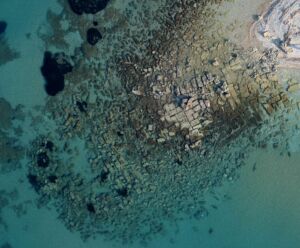News
Danes helped excavate Corinth’s ancient harbour
This article is more than 10 years old.
Team of archeaologists made a sensational discovery of well-preserved remains of Lechaion

Aerial photo of the western mole in Lechaion (photo: K. Xenikakis & S. Gesafidis)
International team of researchers from Greece’s Ephorate of Underwater Antiquities, the University of Copenhagen and the Danish Institute at Athens have made a sensational discovery whilst excavating the ancient harbour of Lechaion in Corinth, Greece.
The archaeologists have uncovered two monumental piers, a smaller pier, two areas of wooden caissons, a breakwater, and an entrance canal that leads into three inner harbour basins.
Rare wooden find
It was the discovery of the wooden caissons that took the researchers by surprise.
Ancient finds of organic material are extremely rare in the Mediterranean because of the water temperatures and high salinity.
Woodworm would normally destroy submerged wooden objects within a few months, however, the caissons have been dated to the middle of the fifth century.
Using innovative technologies
The Greek-Danish team has been working on the Lechaion Harbour Project for about two years and has been using various innovative technologies, including a newly-developed 3D parametric sub-bottom profiler to survey the seaward side of the harbour.
The 2015 excavations focused on an early Byzantine mole constructed of six well-preserved wooden caissons together stretching 57 meters in length, and on the stone-lined entrance canal to the little-explored Inner Harbour of Lechaion.
“We have found and documented several monumental architectural structures, built at great expense, showing that Lechaion was developed as a grand harbour to match the importance of her powerful metropolis, Corinth,” Bjørn Lovén, an archaeologist from the University of Copenhagen, stated in a press release.
Exceptional geographical advantage
Corinth belonged among the most economically and militarily powerful cities of the Greek, Roman and Byzantine periods.
The city had an exceptional geographical advantage and controlled the passage between the eastern and western Mediterranean.
“According to ancient sources, most of the city’s wealth derived from the maritime trade that passed through her two harbors, eventually earning her the nickname ‘Wealthy Corinth’,” explained Lovén.
The town of Lechaion and its harbor enjoyed vibrant maritime activity for over a thousand years, from the 6th century BC to the 6th century AD, when it was destroyed by an earthquake.










































